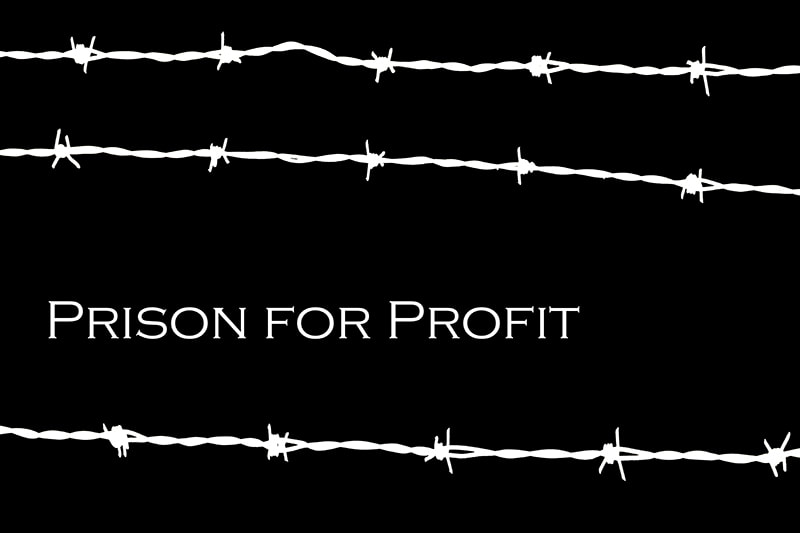|
States and local governments have long contracted with private prisons as a way to outsource carceral needs to cheaper sources of labor. As a result, for-profit prison companies in the U.S. have emerged as a powerful political voice and exerted an influence that has distorted justice systems across the country, according to an Ohio State University Legal Studies Research Paper. The paper’s author, Amy Pratt, a student at the Ohio State University Moritz College of Law, warns that if the influence of private prisons isn’t curbed, sentence lengths will continue to increase, mass incarceration will balloon, and judicial integrity will be in jeopardy. “This voice is unnecessary and should not exist,” she writes in the paper, posted under the auspices of the Drug Enforcement and Policy Center. “Private prison companies are not the officials who are elected to write sentencing laws or to hand out sentences in a courtroom. They should have no say in the process, whether that say is intentional or not.” Private prisons have steadily grown in influence and strength over the past two decades. According to the Sentencing Project, some 115,428 individuals were held in for-profit facilities in 2019, representing 8 percent of the total state and federal prison population, an increase of 32 percent since 2020. Data compiled by the Bureau of Justice Statistics (BJS) and interviews with corrections officials reveal that in 2019, 30 states and the federal government incarcerated people in private facilities run by corporations including GEO Group, Core Civic (formerly Corrections Corporation of America), LaSalle Corrections, and Management and Training Corporation. Longer Sentences Pratt asserts that the sheer existence of private prisons in a jurisdiction can lead to longer sentence lengths. She cites a study conducted by researchers at UCLA, sentence length increased by an average of 23 days after the opening of a private prison, she details in her report. Another study cited by Pratt found that doubling private prison capacities in a state increased sentence lengths in that state’s courts by 1.3 percent, or 18 days, compared to sentence lengths given out by adjacent courts in other states. That study’s authors found that the longest sentences are handed down in states where private prisons offer the largest cost-savings compared to public prisons. But, the attraction of a “cheap high-quality private prison” is a fallacy, Pratt writes. Private prisons are often staffed poorly in comparison to public prisons, and guards in private institutions usually receive less training and less pay to their public counterparts — illuminating the real reasons why private prisons are less expensive upfront, said Pratt. She added that private prisons often end up costing the government more in the long-run than what was saved in the short-run compared to the costs of public prisons. “Because private prisons have higher recidivism rates than public prisons, the short-term cost-savings from the original contract are offset by the long-term costs for the state of dealing with recidivism,” the paper asserted. Follow the Money Private prison companies have been able to drive harsher sentencing laws and policies because of their steep campaign contributions to state and federal politicians, according to the paper. Since 2000, Pratt details that private prison companies have given over $6 million to politicians — particularly those who favor tough on crime policies that fill prisons and are more likely to accept private sector prison takeovers, many of them Republican legislators. These contributions give private prison corporations access to lawmakers who would be willing to pass favorable legislation for them, Pratt explains. During the 2020 election cycle, GEO’s founder contributed $500,000 to Republican campaigns, but just $10,000 dollars to Democrats. Pratt acknowledges that both blue and red states utilize private prisons, and “it’s not an issue that can be solved by electing one party over another.” Moreover, Pratt writes that some private prison companies have even donated to the campaigns of judges in state elections, directly influencing who is elected and what type of policies are enacted. And, if a judge knows a prison is at or near capacity, they might be more likely to give a shorter sentence when possible. But, Pratt writes, if the judge knows a private prison has room, they might be more likely to give a longer sentence that they feel their constituents or court demands. What’s worse, there is documented evidence of judges outright accepting bribes from private prison companies to give out harsher, longer prison sentences that keep beds full. “The influence is seemingly small for the most part, but it should not exist at all,” Pratt explains. “Private prison companies should have no voice in sentencing.” Suggested Solutions “The best solution to preventing private prisons companies from having a voice in sentencing law and policy is to stop using them entirely,” Pratt begins. “However, given their prevalence at the state and federal level, that solution is both unrealistic and unlikely.” While America’s system of private prisons has highlighted numerous injustices, France’s system of utilizing private prison companies shows a different value in aspects of their prison programs. “In France, all correctional services fall under the Ministry of Justice,” Pratt wrote, noting that because of the centralized management, elements of budget, control, and leadership are all still overseen by the government. Moreover, French sentencing law doesn’t have mandatory minimums, and judges are given discretion for maximum sentence — practices Pratt says America could take note from. “The goal of the [French] criminal justice system is rehabilitation, and so incarceration is only viewed as a means to that end, instead of the end itself,” Pratt explains. “This hybrid model makes prisons more expensive, but provides higher quality services to the inmates in them.” Other suggested solutions include:
The full paper is below Andrea Cipriano is Associate Editor of The Crime Report.
0 Comments
Leave a Reply. |
HISTORY
April 2024
Categories |
© Walk 4 Change. All rights reserved.


 RSS Feed
RSS Feed